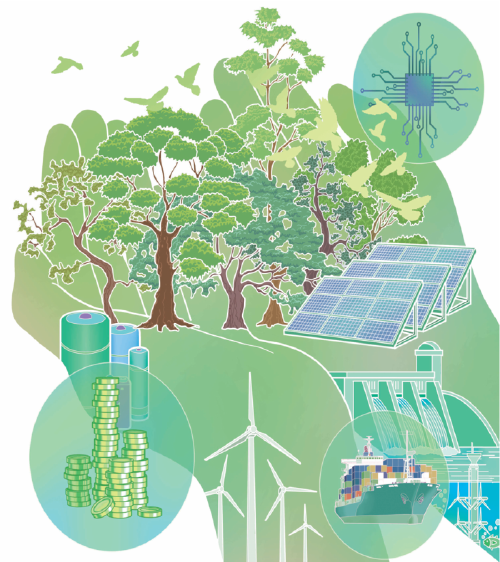Heterogeneity risks


Global coordination imperative for more effective and quicker decarbonization
Reaching carbon neutrality is and should remain our common No 1 global objective, one that unites the people and the countries of this world. Based on what we know, which is the catastrophic consequences of global warming, it will always be terribly complex given the magnitude of the necessary changes in our economies, in our production, in our logistics, and in our consumption patterns and systems. But we have to keep facing together the main international challenges of decarbonization around three main issues: trade, finance and technology. And what these three topics have in common is that they all require global coordination, and are hence governance problems.
In theory, carbon pricing is the ideal policy for markets to internalize environmental externalities that so far have remained externalized. And this is roughly the way to go. If we properly price carbon, then market forces will readjust, relative prices will change, and the international division of labor will adjust to these new relative prices in a more carbon-efficient way. Global market capitalism can, with this, adjust. This is the theory. Unfortunately, it's much more difficult in practice for a variety of reasons, which have to do with the heterogeneity that we have in decarbonization on this planet. Heterogeneity in the time horizons for reaching zero net carbon: 2060 for China, 2050 for the European Union and the United States. Heterogeneity in the time horizons for carbon peaking: China's is still to come, while Europe's for instance, is way behind us. Also, heterogeneity in the tools for decarbonization: taxation, subsidization, carbon trading, as well as other regulatory tools such as the regulation of carbon content in manufactured items.
This very big heterogeneity of trajectories, tools and speeds creates a risk for international trade, as uncoordinated trade measures will inevitably lead to carbon leakage, producers trying to move from places where carbon is highly priced or regulated to places where it is priced at a lower level or much less regulated. And this is a big challenge for international trade, which for instance the EU has started addressing with its carbon border mechanism. I am one of the authors, together with the Brussels-based Jacques Delors Institute of the first template of the European Carbon Border Adjustment Mechanism, which we tabled during the spring in 2020.This tool is now moving forward, and it will probably start to be enforced in 2024 or 2025. We suggest creating in the World Trade Organization a special forum to compare this type of instrument with others in order to facilitate their compatibility.
Decarbonization or reaching carbon neutrality, whatever the time horizon, also necessitates massive investments in many areas, such as renewable energy production, mobility and energy saving in manufacturing or housing.
Finance availability is a big problem for lower-income countries, most of which are the main victims of global warming, given the impact it has on them, on their populations or their food systems. And we all know that most of them do not have the resources to invest enough to be able to address these challenges. There were many pledges from the Paris Agreement in 2015 to the Glasgow Climate Pact last year, but most of these pledges have not yet been fulfilled. So, we have a North-South deficit in finance which needs to be addressed. And my hope is that by the time of COP 27 in Sharm el-Sheik, Egypt, later this year, we will have increased convergence at the international level between financial institutions, the World Bank, the International Monetary Fund and regional development banks, including the Asian Infrastructure Investment Bank, to match this North-South finance gap, which I see as a big looming problem for both public and private funding. Especially if we factor in the fact that the COVID-19 pandemic has had on these countries a disproportionately negative impact, thus constraining even more than in the past their capacity to raise money on international markets. That's an urgent issue which I see as necessitating much more global governance. The recent creation of the International Sustainability Standards Board is a good example of what is needed.
The third big global coordination challenge is about technology. If we read carefully the latest Intergovernmental Panel on Climate Change report, we have to recognize its determination, according to which overshooting the 1.5 C threshold is now, and I quote, "almost inevitable". This is very bad news. The consequences of overshooting this 1.5 C threshold are extremely negative for most countries. And this forecast necessitates us to look again at this combination of mitigation, less emissions and adaptation, making sure that our economies and our societies can cope with global warming. We should also look at various technologies which could help in emitting less and absorbing more carbon, or limiting the impact of the greenhouse effect. And these technologies are around carbon capture or even solar reengineering. These technologies also raise serious global governance issues.
We cannot reach carbon neutrality without a strong cooperation between the US, EU and China. Nevertheless, in the US, it will probably be slower than we would wish or expect. This leaves a big responsibility on the shoulders of China and Europe. The EU was instrumental in transferring its own technology, the carbon trading system, to China, which is now operating a sort of European-like trading system with Chinese characteristics. This is a good base. And we have to leverage this good base in trying to expand this to other countries, showing that it works for a highly developed economy like a Europe, or a rapidly emerging economy such as China. Also, both the EU and China have massive financial resources, financial reserves with savings, and a sophisticated financial system that could help both public and private investment to move more from the North or China to the South. And finally, on the technological and scientific challenges, such as carbon capture and geo-engineering, Chinese and European scientists are at the frontier of new discoveries in this area and they probably can work together to help accelerate the availability of beneficial technology stemming from the scientific research.
The author is a distinguished professor at China Europe International Business School, a former director-general of the World Trade Organization, and the Chair of the Paris Peace Forum. The author contributed this article to China Watch, a think tank powered by China Daily.
The views do not necessarily reflect those of China Daily. Contact the editor at editor@chinawatch.cn.


































